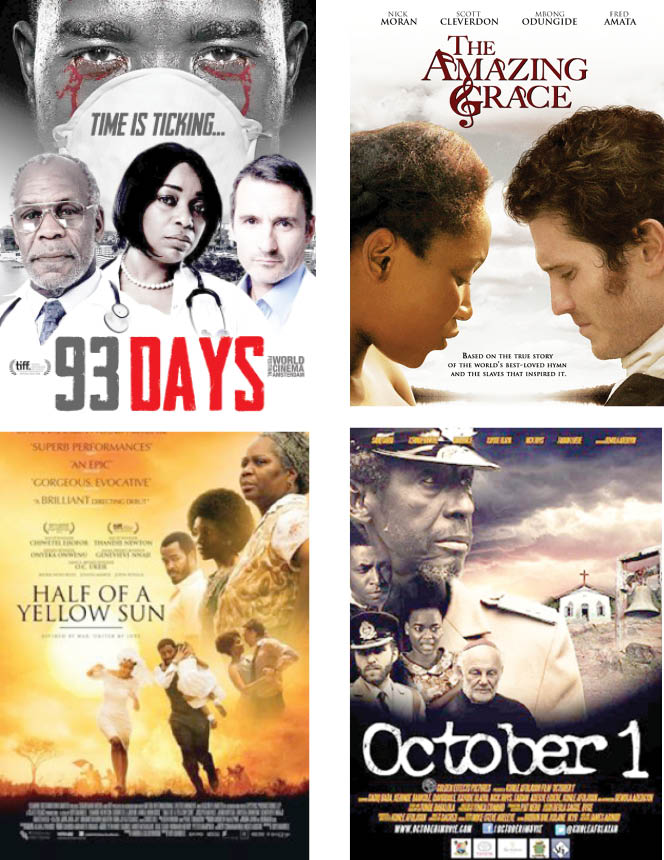Nollywood movies that spotlight historic moments in Nigeria
Over the years, Nollywood movies have not only entertained audiences but also served as powerful vehicles for storytelling, shedding light on significant historic moments that have shaped the nation’s identity. In this Weekend Magazine feature, we explore some of the Nollywood movies that have immortalized historic moments in Nigeria’s journey. October 1 (2014) – […]

Nollywood movies that spotlights historic moments in Nigeria
Over the years, Nollywood movies have not only entertained audiences but also served as powerful vehicles for storytelling, shedding light on significant historic moments that have shaped the nation’s identity. In this Weekend Magazine feature, we explore some of the Nollywood movies that have immortalized historic moments in Nigeria’s journey.
October 1 (2014) – Colonial era and independence struggle
“October 1,” directed by Kunle Afolayan, takes us back to Nigeria’s colonial era and the eve of its independence in 1960. The film revolves around Inspector Danladi Waziri, who is tasked with solving a series of gruesome murders in a small town. Through a gripping murder mystery, the movie unveils the complex socio-political tensions leading up to the country’s independence, highlighting the struggle for identity, justice, and unity during a pivotal time in Nigerian history.
76 (2016) – Nigerian military coup
Set in 1976, “76,” directed by Izu Ojukwu, offers a gripping narrative centred on the aftermath of a military coup in Nigeria. The film follows the life of Joseph Dewa, a young military officer accused of being involved in the failed coup against the military regime. With its realistic portrayal of the political unrest and intrigues during the military era, “76” provides a window into a tumultuous period in Nigeria’s history.
King of Boys (2018) – Politics, corruption and power struggles
In “King of Boys,” directed by Kemi Adetiba, we witness the ruthless world of Nigerian politics and the struggles for power and influence. The film revolves around Alhaja Eniola Salami, a powerful and controversial businesswoman who delves into politics. The narrative explores themes of corruption, betrayal, and the complexities of power dynamics, reflecting some of the darker chapters in Nigeria’s political landscape.
Collaboration crucial to Nollywood growth – Joke Oke
DPO goes viral after paying dowry for lovers to get married in Kaduna
93 Days (2016) – Ebola outbreak and health crisis
Directed by Steve Gukas, “93 Days” portrays the harrowing true story of the Ebola outbreak in Nigeria in 2014. The film centers on the courageous medical professionals who risked their lives to contain the deadly virus. “93 Days” pays tribute to the selflessness and dedication of healthcare workers and celebrates Nigeria’s resilience in overcoming a major health crisis.
Amazing Grace (2006) – Slave trade
The film “Amazing Grace,” released in 2006 and produced by Jeta Amata and Alicia Arce, centers around a significant moment in Nigerian history – the slave trade. This British-Nigerian drama follows the story of John Newton, a British slave trader, who voyages to Nigeria with the intention of buying slaves. However, witnessing the brutalities of slavery and facing near-death experiences, Newton experiences a change of heart. He attributes his survival to the grace of God, leading him to renounce slave trading and embrace a new path as an Anglican priest. His journey culminates in the creation of the renowned hymn, “Amazing Grace.” The movie features a stellar cast including Fred Amata, Joke Silva, Mbong Amata, Nick Moron, Zack Amata, and Mbong Odungide. Through compelling storytelling, the film vividly portrays the violence that marked the British trans-Atlantic slave trade, shedding light on the transformation of Nigerian society. As the characters adapt to the western lifestyle, they forsake their traditions, clothing, and religious beliefs. “Amazing Grace” stands as a powerful and relevant visual representation of the slave trade, capturing the essence of this critical period in history.
Oloibiri (2016) – Niger-Delta oil exploration
Oloibiri, the 2016 Nigerian action thriller film, directed by Curtis Graham and produced by Rogers Ofime, stars Olu Jacobs and Richard Mofe Damijo. The movie depicts the exploitation of newly discovered oil in the historic town of Oloibiri by government agencies and oil companies. Its premiere took place on 21 October 2016 at the Shell Nigeria hall, Muson Centre, Onikan, with notable attendees such as General Yakubu Gowon and Emeka Anyaoku. Former Minister for Information, Professor Jerry Gana, praised the film for its impactful message on the struggles faced by people in the Niger Delta and encouraged more filmmakers to address such issues. Richard Mofe Damijo’s portrayal of “Gunpowder,” a disgruntled indigene turned militant, garnered acclaim, prompting him to call for aid to the Niger Delta from the government and international organizations.
Nollywood’s contribution to preserving Nigeria’s historic moments through cinema cannot be overstated. Through films like “October 1,” “Half of a Yellow Sun,” “76,” “King of Boys,” “93 Days,” audiences are presented with narratives that not only entertain but also educate and inspire. These movies serve as a reminder of the trials and triumphs that have shaped Nigeria’s past and continue to influence its present and future. As Nollywood continues to evolve and grow, we can expect more films that showcase the nation’s history, bringing to life untold stories and shedding light on crucial moments that define Nigeria’s unique identity on the global stage.
Half of a Yellow Sun (2013) – Biafra war
Based on Chimamanda Ngozi Adichie’s novel, “Half of a Yellow Sun” presents a poignant portrayal of the Nigerian-Biafran War (1967-1970). The film follows the lives of two sisters, Olanna and Kainene, and their experiences during the war. Through their personal journeys, the movie captures the devastating impact of the conflict on families, communities, and the nation at large. “Half of a Yellow Sun” sheds light on the human cost of war and serves as a tribute to the resilience of the Nigerian people.
